Divinity: Original Sin 2, and the Evolution of Life on this Planet
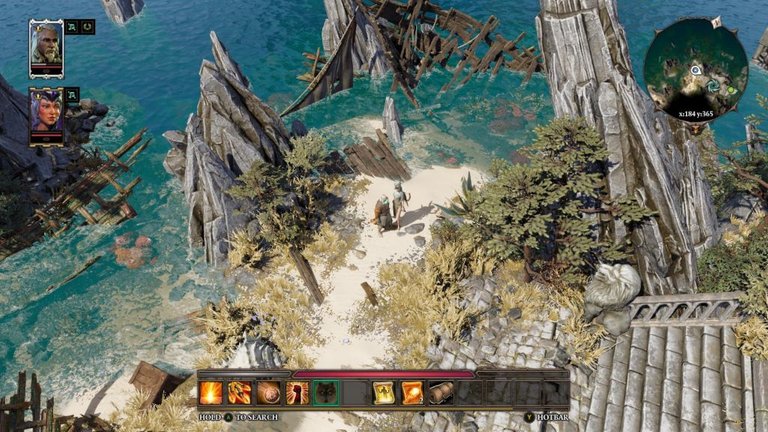
Life on this planet has evolved along different stages that are founded upon the type of technology available at any given stage. Unicellular lifeforms appeared 3-4 billion years ago with relatively simple mechanical abilities (compared to modern multicellular species). As time passed, these species mutated, grew in complexity, and upgraded to the latest wetware/software tech available. Updating to this new tech (e.g., gills, fins, lungs, backbones, arms, legs, etc) allowed life to migrate from the oceans to land & air. This evolutionary process was relentless and quite rapid in geological time. No matter what you threw at DNA (including meteors and ice ages), it always found away to survive and expand its code across the planet. It diversified by creating new species using the basic rules of Darwinian evolution. DNA machinery and intelligence became excellent at developing and manufacturing new species. Each stage, set up the next one, each one more complex, reaching a tipping point when the tool-using primates showed up to the party.
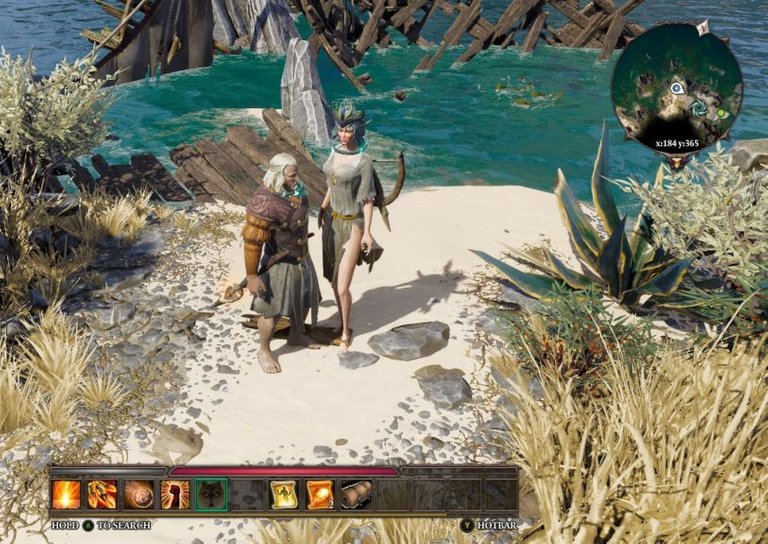
Primate intelligence represents a unique development in the history of life. Our capacity to sense, perceive, and process matter-energy-information is second to none. Our development has followed a trajectory based on the various technologies (internal and external) that we have developed. Generally, we tend to group stages of human development based on the type of element we learn to process at various points in time- fire, stone, bronze, iron, etc. Eventually, we reached a stage of development in which the most important element was not material but symbolic. The Gutenberg press allowed us to store and disseminate our thoughts, inevitably leading to the industrial revolution. While Marxists liked to place emphasis on the "means of production," the true star of the show was information, but that wouldn't become clear until we reached the next stage- the information age. Since the industrial revolution, we have learned to use even more advanced technologies such as atomic, biochemical, and genetic. But none is more salient and more familiar to us than the electronic, and the digital worlds we now inhabit. Through our actions as we navigate and evolve in these info-oceans, we are now creating the foundations for the next evolutionary leap. What might that leap look like?

The homo sapiens species has clearly become homo sapiens digitalus or maybe electronicus. Thanks to the work of physicists- who themselves didn’t know that they were unwitting evolutionary developers- we’re now seeing a great migration into the electronic realms. As it’s standard procedure, we have harnessed electronic energy to support the basic parameters of mammalian life- survival (e.g., food-production and processing), emotional-territoriality (e.g., weapons and national security), symbolic-thought (e.g., sci-tech engineering and development), and sexual domestication (e.g., tiktok gyrations and instagram lascivousness). As we migrate further into the electronic ecological niches of the cyber-verse, new possibilities open up. What are these possibilities? What form will they take?
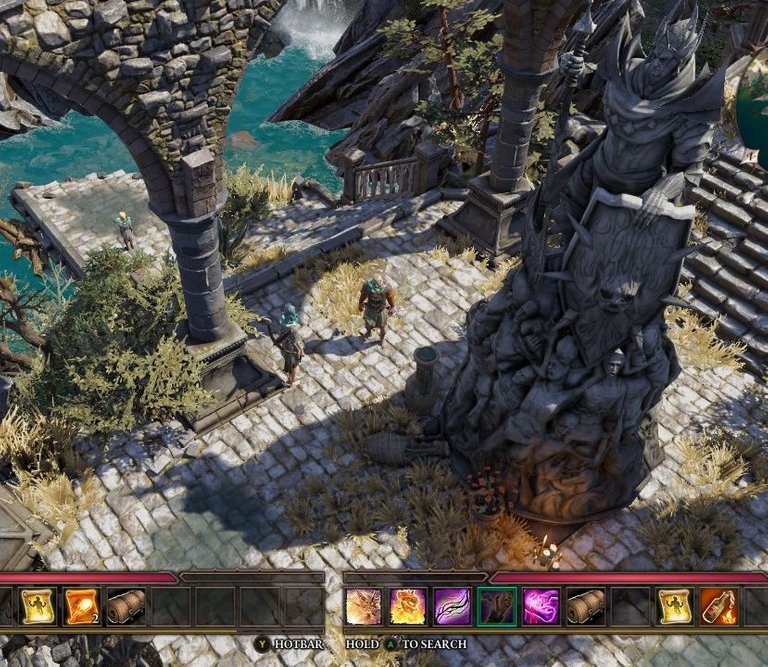
It’s not clear to me what shape the new virtual realities will take. Nevertheless, we are beginning to see glimpses of our virtual future. Video games are a good example. The adoption of video games since they first became widely available commercially in the 1970s has been phenomenal. The bleeps and flashes of the digital-quantum unmapped territories have turned into full fledged shimmering lattices of socio-economic environments. They are not frivolous pursuits, at least not broadly speaking, though they can be at an individual level. Video games are serious business, and I’m not just talking about EA profits. Video games are an early larval phase of our electronic mutation into a new digital species. We are the amphibians squirming, slipping, and sliding together along the shores of the metaverse.
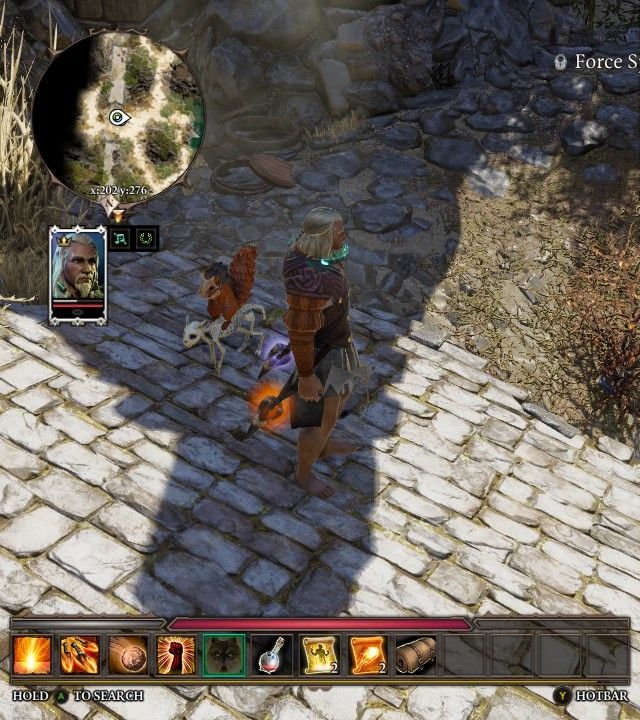
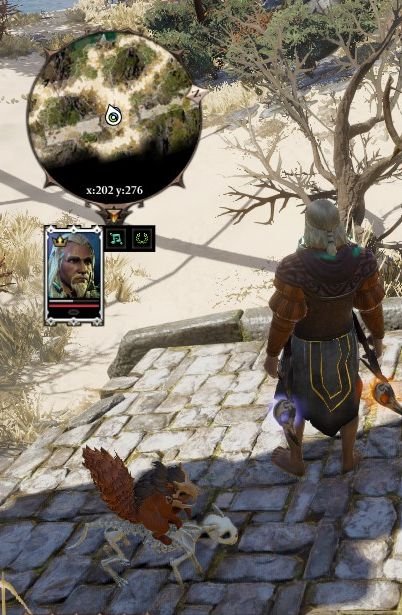
With rudimentary skills and gear, we prepare for the next stages of our evolution, which is fraught with so much danger, riddled with so many unknowns. Just as we began that journey from water to land millenia ago, we now begin our new adventure into the electronic future ahead. We'll evolve cheerfully with confidence, with our heads up, and with a little help from our (hopefully buxomy) friends.
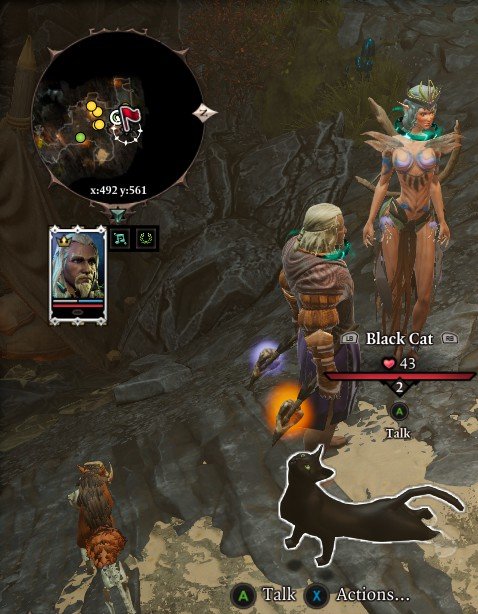
Video game: Divinity: Original Sin 2
Level: 1
Location: Fort Joy
Class: Wizard
Screenshots by @litguru
I am a bit uncertain, if your text has a poetic approach or how it is meant ...
For some an adventure, for others a horror show. I am not so sure that human evolution is really a straightforward success story. I find, it might be not necessarily linear, one speaks of cyclical "donut-like" events. I understand evolution as an organic, very slow process. Where the possibility of feedback loops are contained.
Somewhere I once heard, it must have been about twenty or more years ago, that a large part of the planetary population still exists as peasants, including the skills necessary for that. In comparison, it was said, technological development and its associated amenities are more accessible to a minority. I don't know if that is true or was true at the time.
I wouldn't know whether it is really a matter of further development and not a step backwards in our human organic existence, or of stagnation. For an extra sausage of the human race, I cannot imagine that a plunge into an electronic age will provide the brave new world, especially as we organics are very much in dependence and interaction with all other organic living beings on this earth. Dolphins and schools of fish, birds and mammals, insects, etc., all have no access to the electronic collective, but how can humans separate themselves from them without harming themselves? So wouldn't dolphins, giraffes, monkeys, dragonflies, bees also have to have an electronic future if we humans are heading towards it?
As I see it, flora and fauna have no access to our electronic world. Yet we use everything we think we know about The Plant and Animal Kingdom to create imagined habitats in the virtual environments. It would be a lot more boring without them, wouldn't it?
But I have a hard time separating the "we" in your sentence from the animal and plant life, which I believe is as much a part of the "we" as humans.
As Allan Watts once put it, the bee and the flower belong to one organism, even though they are different living beings. In the view of the whole, one could also consider our planet as a living being, I think. Humans, as just one species among many, would not this species, from "the point of view" of the larger life form, merely be something that occupies a place, but not the most important? For me, the question is not settled as to what role man occupies in his earthly existence; even knowledge of ourselves has its limits, for to think something beyond ourselves, outside the human mind, is a thing of the impossible. So a certain area remains inexplicable to us, I think.
In genius dwells madness as well as beauty; it often seems to me impossible to separate one from the other.
Wow, thank you for this thorough and well thought out comment @erh.germany. There is a lot to unpack, so let me put on my funny hat and see if I can groove off your ideas.
Indeed. Organisms fight and eat each other; volcanoes explode and wipe out entire population; Meteors strike and delete entire species; black holes devour whole solar systems; and so on. So we can take a (cognitive) brush and paint the whole of existence black.
I come from a different school of thought, however. I'm with Aldous Huxley on the following point:
Imagine getting up close to a painting. You will be able to see the blemishes, the uneven strokes, and the hesitation of the artist. But when you stand back and see the entirety of the work, then you see perfection and genius. It's the same with bio-evolution, including human evolution. If you look up close at the details, you see the horror of coming into this world only to end up dead, sometimes in terrible ways. But when you stand back and look at the whole mad brawling shimmering jagged lattice of cosmic evolution, then it's absolute beauty and perfection.
I agree that biological evolution exhibits non-linear processes, and unfortunately, we do not have the propper scientific model to understand it from that angle. But we can still investigate the details and look at the pieces of it to figure out how they're put together. As an example, we didn't have a good grasp of species nomenclature until Linnaeaus developed the system of classification. The understanding of the chemical and atomic workings of our universe had to wait until Mendeleev neatly and lovingly organized the table of elements. Similarly, our understanding of species evolution was not clear until Darwin (and the other guy) put the species in their corresponding linear configuration as described by our fight, flight, and mating instincts. So far, there is no similar table of classification for evolution in terms of its broad stages, but we can guess at some general patterns in terms of the need for survival, safety, sexualization, symbolic manipulation-reproduction, and "self actualization".
I think it depends on what scale you're using to measure. From the limited 100-year lifespan of the human perspective, yes, biological evolution is a slow churning process. From the glacial perspective of "geological" time, however, evolution is a video in fast-forward. Jazzy. Splashy. Squiggly. Untidy. Utterly delightful quick mess of coding, encoding, and recoding DNA instructions into the future. To put in perspective. Some say that if you were to condense the history of earth into one year, January marking the beginning of the earth, then agriculture is invented on December 31 at one minute to midnight, and the industrial revolution occurs at 2 seconds before midnight. That's staggering speed! Most of the recorded history that we're taught in Schools has happened in the last second before midnight.
Absolutely! To clarify, I'm not saying that all of us are going to migrate to the new frontiers in space, digital worlds, genetic biospheres, atomic oceans, or quantum kittyverses. Some will choose to stay or simply will not be able to follow the speedy flashy glitzy species that are now emerging. These new species will colonize the infoworlds of the future. We're doing it at this very moment. Just think of it. You turned on your computer and received a transmission by some dude who calls himself @litguru. The message entered your visual system, and then it traveled down neural pathways detonating picaresque thought-bombs in your neural systems. You proceeded to formulate a response, and then using appendages like fingers and keyboard you turned your ideas into electronic beads that you hurled into space and then across the globe all the way from Germany to Canada. Talk about electronic brain! I got a funny feeling we are not in Kansas anymore.
I'm in agreement. Not only plants, but rocks, sand, sea, volcanoes, and every creeper that crawleth upon the earth. Then there are external processes and energies such as magnetic fields, solar radiation, and so forth. Now stand back from the picture and look at the entirety of the cosmos right before you and what do you see? A living breathing pulsing nervous system spanning light-years across spacetime. Phew, lad!
HaHa, thank you for grooving with my reply. Highly appreciated! :D
I often take exactly your view of things when I am personally provoked by someone taking their individual situation as all too tragic.
However, the personal, local and unique situation is exactly what I experience on a daily basis. Much more so than the detached, cosmic view of life in and of itself in the grand scheme of things. It is like being very tense and having a glimpse of the inexplicable, but already being drawn back to the routine and banality of the everyday. I don't think you can weigh one against the other, you can't even separate them. The ability to take distance from oneself is always limited in space and time. You've got to snap back again into your very unique existence, otherwise you could not make a difference. That is a good thing, I think.
For me personally, I contradict you, for example, and choose the word "horror" when I think I perceive an overhang to the cosmic (your text is also only a part of your description of the world, but I must start somewhere). The drift into the universal always provokes me to compensate when I see that the unique, the individual human being is lost in it.
I once read in the Buddhist or Zen teachings: If someone asks you a spiritual, cosmic question or offers you a theme, answer in everyday terms. When someone offers you mundanities, answer in the spiritual sense. In fact, I think people often try to strike this balance, but they don't always succeed.
The non linearity of times:
I think, you don't need necessarily a scientific model, you understand it also by intuition, through art, for example. Or real life experiences like a trauma (seeing an accident, blood, dead people, giving company to birth or a dying person etc.)
When someone close to you dies, you are very sad and probably shed tears, right? If someone would approach you right in this sadness and told you that it's alright, it's a cosmic dance, how would you react? Or, even worse, not even mention your loss. Pretending, it did not happen, chatter superficially. You are not always a cosmic giggler, aren't you?
As an individual, you need time to mourn but you depend on the social group to give a cultural meaning. Once, it's given to you, you can go on with your life. If you are denied or overlooked in this matter, it hurts badly. From how I perceive modernity, people give up their traditions and ceremonies in real life gatherings when it comes to birth and death.
Both is useful: my individual perspective as much as the galactic perspective. Whether I put my foot in my mouth or wait for just the right moment to offer a view. The recipients of messages sit at their respective ends and interpret them for themselves.
I find it more impressive to experience actual telekinesis without the aid of electronic devices or satellites. My admiration for technology has never been very great, perhaps because I grew up with it. LOL
I am interested in phenomena, why people notice they are being stared at from behind, how they can know above chance, who's calling them on the phone etc. - these are little-noticed phenomena, everything is thrown at technology, I find. Have you heard of Rupert Sheldrake? He is one of the few who takes on a scientific attitude to those very phenomena. Quite inspiring and humorous.
I hope I will be dead by the time, I find that technology dictates my every day life to almost full capacity. I like to have a computer and a phone. I distaste being commanded to use it or being outcasted if not doing so.
I have even thought about why one would necessarily want to prolong one's life, when the speed of change in technologies actually requires a rather shorter life span, within which adaptation is less difficult than in a really long human life?
A person's age and origins are significant and what I object to is the disembodiment visible to me, to see one' s flesh as inadequate. The desire for perfection, it can be deceptive, an unconscious rejection and contempt of man towards himself. A (hidden?) death wish.
I also speak from a females perspective, having given birth to another human being through pain and risk.
Maybe it's important to ad that :)
I have not gone into all your points now, but it should suffice for now.
A pleasure talking to you. Thank you!
Ha! I thought you were a dude. I love plot twists!
I think we have similar and also different views on certain matters of existence. This is great because I also enjoy being proven wrong. I can see you have given deep thought to these heavy matters.
Being female does give you a unique perspective. You mentioned birth, so here's an analogy you might find interesting. Imagine a woman lying on a bed. She's screaming in pain. She's sweating. Breathing heavy. There is blood and fluids everywhere. Oh no, how terrible! Some might say. Then someone points out that the woman is having a baby. That's why she's in pain. Ah! She's giving birth! A totally natural process. There is nothing to worry about. We just need to use the tools that we have at hand to deliver that baby.
In the 1970s, James Lovelock and Lynn Margulis proposed that the organic and inorganic components of the planet act together in such a way as if they're parts of single organism. The Gaia hypothesis. Imagine that: The Earth is alive! If the planet is indeed an organism, then it will reproduce and give birth to a new lifeform. Before it does so, it will go through birth pangs. War, pestilence, disease, pollution, economic upheavals, and all the other horrors we see around us are part of this proccess. The Earth got knocked up and now she's pregnant. So it's up to us to deliver that baby safely using the best tools at hand. A thrilling adventure!
You're right that it's not possible to always be thinking of cosmic matters all the time. But there are techniques that can help you bring awareness to the moment. Every moment has the potential for grace. In his novel Island, Aldous Huxley wrote about a tropical society that used the principles of Buddhism to govern themselves. In the island where they lived, there was a talking mynah bird that called out Karuna! as he flew around the village. The call of the bird was a reminder to the population to center themselves, be aware of the moment, and act with compassion. Neat!
This novel, Island, is in my opinion Huxley's cosmic best, and I highly recommend it.
Immortality, you say? Yes please. I'm all for it. There is no compromising here, sister. It's DNA's lofty goal according to the instructions from the manufactuers at Cosmic Central. 😜
Well... if you stick around, you're gonna find out.🤠
Thank you so much for engaging in such a thoughtful and compelling manner.
HaHa, I oftentimes am mistaken for a guy. :D
That's the spice of our conversation.
I agree very much with what you said about the scene of giving birth. Where I want to interfere, is this:
Using tools to help a baby into the world is - by nature - the exception. As a rule, tools are superfluous. Rather, it is about the mental and physical constitution (both are related, as we agreed) of the woman giving birth.
For thousands of years, women have given birth to children and needed little more than the expert help of a midwife. Often not even that, if the woman grew up in a circle of women where she became a living witness to the birth process and learned what to do. The power of the act of birth, the positivity of the women participating, whether during or after birth, has a significant influence on how strengthened or weakened a woman is willing to surrender to this process. The greater her resistance and worry, the greater the fear of those around her, the more difficult it will be for her to have her child. The same is true in reverse.
Next to my own experience, I have read numerous birth reports, some of them impressive, because there are women who prefer to stay alone because they find any human presence disturbing. Others, on the contrary, want the father to be there, as well as other children, and as many close ones as possible to be involved.
I am quite partial to the Gaia view and think that the earth can be called alive, though not in a wholly organic sense - rather, as you say, it goes beyond that and is "other", an assemblage of material and immaterial that does not open up to human understanding with complete precision. It is more like an indirect hunch, a form of understanding that eludes precise description. The consciousness of the earth or also of the sun etc. would probably be rather inaccessible to us human beings, even if the giant celestial bodies communicated with us, they could not do so directly but indirectly. Similarly, as my own body cells are not able to speak with me, the total organism, there can be no word-for-word speech between us. It is a matter of interpretation and intuition, which can be both rather true and rather false on the wide scale of possibilities.
However, I do not see any way in which the animals and other living beings of this planet could pass into an electronic form, since they do not have access to, for example, quantum mechanics, through anything to be known. Dolphins obviously use their habitat as they find it, they do not build underwater installations etc., just as all other life forms merely use what they find, without combining anything utterly new from the found matter or changing the aggregate states. Except that it takes place outside our perceptual spectrum, of course, I can't rule that out.
My thesis, however, goes in the direction indicated in my former comments. Human consciousness feels a great lack of satisfaction alongside contentment, and the aspirations to become "better" seem to me to be rather an absurdity of what is already good and beautiful. When we have recognised devices, machines, etc. as extensions of our extremities, we also realise how much they give us comfort. Equally, however, they prevent us from doing the physically necessary work of keeping our limbs in motion so that walking, stretching, bending, kneeling, climbing remain a natural part of the human being. From my point of view, the human being is and remains flesh to the extent that he or she is spirit.
What I see is, that us humans fight a fight against ourselves in not accepting that we are both, matter and spirit and force us to choose between "either, or" ... but then again, this seems to be the cosmic law of never ending destruction and creation :)
Oh, brother, I would have a lot to say about immortality, but I don't want to anticipate it, except that I'd rather ask you a question:
Have you thought the concept of immortality through to the end of your mind? If you follow or already followed this train of thought consistently, what do you conclude?
Will you let me see your dark side? ;-)
Wow, we have really gone down the rabbit hole, Alice...err I mean @erh.germany. The points you make are very good, and I have lots to say, but I can't address every point atm, or I'll never get my muse out (or into) my couch for the story contest. 😊
Darkness and light. Two sides of the same coin.
P.S. Thanks for pointing out Huxley's other works. Sounds really interesting and I may read it.
!PIZZA
The comments in this post are the most intellectually stimulating and interesting that I have come across in ages. !PIZZA But then I shouldn't be surprised to find @litguru and @erh.germany, two of my favourite authors on the blockchain 🙌💗
My brain still hurts. 🤣
😂😂😂😍
PIZZA Holders sent $PIZZA tips in this post's comments:
@samsmith1971(5/20) tipped @erh.germany (x1)
Learn more at https://hive.pizza.